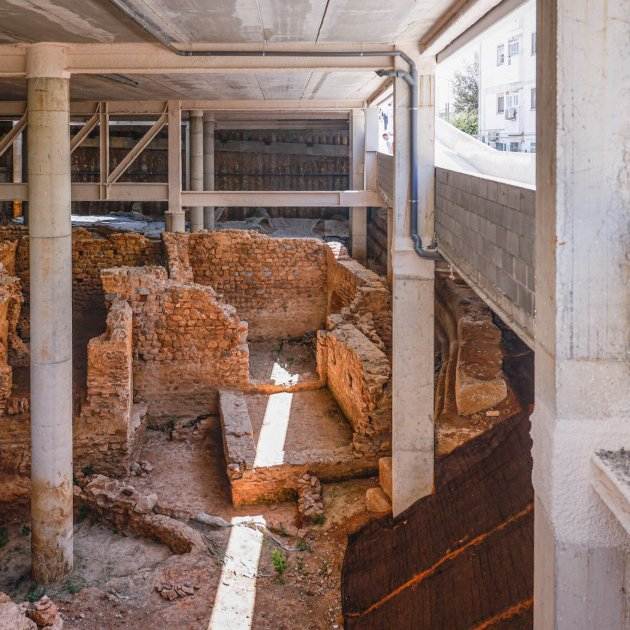The unearthing of archaeological remains can be either an historic discovery or a headache, depending on one's point of view. It makes sense to initially treat all heritage assets as deserving preservation, but this issue can collide head-on with planned developments on a site, which are often the reason that the ancient ruins are found in the first place. Underground car parks surely have the dubious honour of being the number one archaeological destroyers, and of this we can find endless examples in Barcelona, a city with a 2,000-year history of urban construction and reconstruction. One classic case in the Catalan capital is in the Plaça Comercial, right in front of the old Born market, where the need to create space for automobiles prompted the destruction of 18th-century subterranean remains that are very similar to those now celebrated by the old market's conversion into the Born Cultural Centre. And now, in Calella, north of Barcelona on the Maresme coast, a compromise solution to the same dilemma has allowed part of the Roman site of Roser to be preserved. Albeit, with a supermarket on top.
This week, on Tuesday, August 1st, the Aldi supermarket chain opened its first establishment in Calella, on a lot located right next to the Sant Jaume de Calella county hospital. It is a space where apartment blocks were planned at the beginning of this century, but the first archaeological finds, from the Roman period, stopped the project in its tracks, and despite a plan to make an archaeological garden on the site, eventually it came to a halt and the city council simply adapted the space into a parking lot for hospital users. That went on for years until, in 2018, the project to build a supermarket there took shape and, in parallel, fears began to grow that the archaelogical remains would disappear.
Six years later, the fear of the Roman remains' obliteration has faded, although what has come in its place is not to everyone's liking, and the project is still incomplete. But, as the retail establishment raises its shutters, it is evident that the remains have been preserved and, in a visit on the eve of the supermarket's opening, both Aldi and the Calella council showed the result of the agreement that will, in the future, make it possible to have a cultural facility that includes the preserved remains, which belong to a Roman villa from the 1st century of the Common Era.
However, as the works went on, they provoked a significant protest movement from local residents, because although the preservation of the archaeological remains was always under consideration by Aldi and the city council, the excavation work made it clear that the site had much more historical importance than had been initially foreseen. Thus, concerned locals organized to stop the construction of the supermarket, creating the Platform for the dignification of the Roman villa of Calella, which wanted more than just fitting the 1st century ruins into the 21st century carpark, and instead demanded that the work on the supermarket be stopped altogether, and which now, with the project completed, complains that the site has been "fragmented, because the retaining walls of the supermarket have destroyed the unity of the remains", as platform spokesperson Joan Juhé told ElNacional.cat.
"New cultural facility"
Despite the protest platform's campaign, the Aldi firm and the council eventually reached an agreement which, according to the mayor, Marc Buch (of Junts), will allow "Calella to have a new cultural facility", which, in any case, will be opened at a future date yet to be determined. At the moment, what has been done has been to preserve the remains, as well as a part pending excavation and provide them with access independent of the commercial establishment, so that in the future, it can be turned into a museum and opened to the public. Or as Alexandre Pagès, head of Aldi's expansion, puts it, "We have recovered the archaeological site of the El Roser Roman ruins".
So, site preserved, yes; but differing views and a lot of work still to be done. One side calls it "a temple of shame", the other "a project of excellence". For the moment, the remains have been preserved encapsulated in a basement without contextualization, while up above the Aldi supermarket is in operation with a sales area of 1050 square metres and parking for 74 vehicles. On the other hand, in a few years, if everything goes as planned, the brand new Roman Museum of Calella will be right below the supermarket, although without the approval of all the neighbours who believe the damage has already been done.
